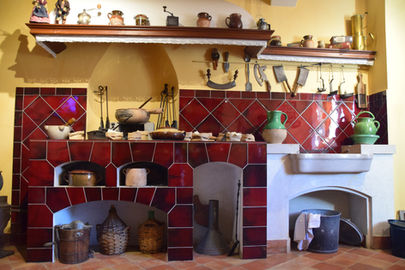History of the Museum
During his professional career, Auguste Escoffier trained more than 2000 chefs, including the patron of our Foundation, Joseph Donon.
Already famous and busy at the Carlton in London, Escoffier noticed him during a visit to the town of his birth, when Donon was working as a commis chef at the Villeneuve-Loubet chateau. When he left for England a few days later, he took the young man with him. Escoffier promised to teach him all the tricks of the chef’s trade. Once trained, our patron crossed the Atlantic and enjoyed a meteoric career in the United States, where he served the prestigious Frick and Vanderbilt families.
After Escoffier’s death, two of his close collaborators, Paul Thalamas and Eugène Herbodeau, suggested to Joseph Donon that a museum be created in the master’s memory, in the house where he was born in Villeneuve-Loubet. Appreciative, and wishing to pay homage to his master and to extend his ethics and work, the latter agreed to finance it.
The museum opened its doors on 2 May 1966, sixty years after master and disciple met.
Its ten rooms form the backdrop to the master’s memories, and also to items and utensils of the time, a wealth of documents on the culinary art, dressed tables, a Provencal kitchen, a collection of over 3000 menus, both ancient and modern, items made of sugar and chocolate, as well as a large library and a research centre on gastronomy.
Donations and legacies regularly enrich its collections.

Auguste Escoffier

Recognized as the father of modern cuisine, Auguste Escoffier (1846-1935), the “Chef of Kings and King of Chefs”, is still considered as one of the greatest of French gastronomic chefs.
A generous, inventive and visionary man, this humanist and philosopher made a profound impact on his profession by way of an exceptional career.
With César Ritz, Director of one of the largest hotels of the 19th century, he created the basis for the luxury hotel and catering trade, still going strong today.
His major work, the Guide Culinaire, a veritable chef’s bible, remains a famous competition reference for the Meilleur Ouvrier de France.
The Escoffier Museum of Culinary Art allows you to enter the house in which this extraordinary chef was born.
Auguste Escoffier was born in this room, where all his most personal of memories are gathered: books, family photos, handwritten menus, awards received, and in particular the Légion d'Honneur, which he was the first chef to receive.
His desk is the masterpiece of this room, at which he wrote his reflections on the culinary art, and also on poverty.
A few of the oldest works held by our document centre are also exhibited here.

The Culinary Art
Plunge into the world of gastronomy in this Museum of Culinary Arts unique in France.
Ten exhibition rooms will allow you to discover part of the history and development of cuisine through miscellaneous objects, period utensils, old furniture, and also through the personalities who have marked French cuisine.
Room dedicated to the Art of Patisserie
In this room dedicated to the art of patisserie, magnificent sculptures made from sugar, sweets and chocolate will awaken your senses: your eyes, and also your sense of smell!
A true homage to the pastry chef’s trade, this room reveals the artistic side of these professionals, little known to visitors.
As soon as you enter the room, the scent of chocolate envelops you, thanks to the constantly renewed sculptures.
It was following the success of the temporary exhibition “The cherry on the cake” (2011) that the Museum integrated these works into its permanent collection, thanks to donations from all the exhibiting pastry chefs, members of the APRECA (the now-defunct Association of Pastry Chefs from Starred Restaurants on the Côte d'Azur).
Discover a rich collection of menus dating from 1820 to the present
The collection exhibited on the top floor of the Museum, in chronological and theme order, brings together a wide variety of menus printed on silk, sometimes decorated by delicate scrolls and even written in calligraphy over artists’ drawings.
A veritable invitation to travel through time, the menus will allow you to discover the changes in our tastes and our eating habits!
A library dedicated entirely to Gastronomy
Regularly supplied by new purchases and donations, it boasts 4200 works from the 17th century to date, from Le Cuisinier François by La Varenne (1650) to the Grand Livre de Cuisine by Alain Ducasse, via the Deipnosophists Banquet of the Learned Atheneus by Naucrates (in Greek) and the much sought-after Heptameron des Gourmets by Edouard Nignon (1919 edition).
And of course, not forgetting original editions of the writings of August Escoffier.
The documents centre can be accessed by appointment by enthusiasts, students, researchers and foodies of all nationalities.
The works can only be consulted on site.
For more information, please contact us at:

The Video Library








Find all our videos on our Youtube channel by clicking on the logo below:











